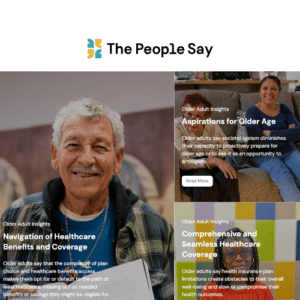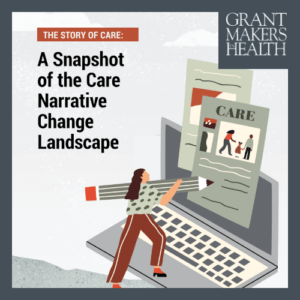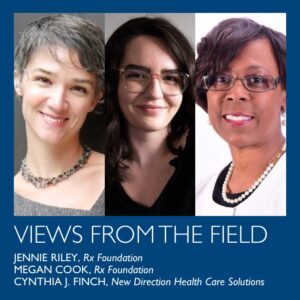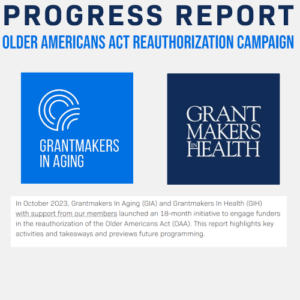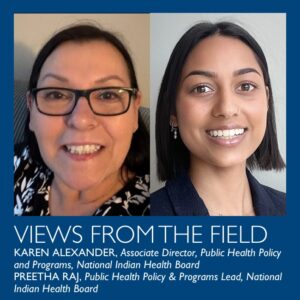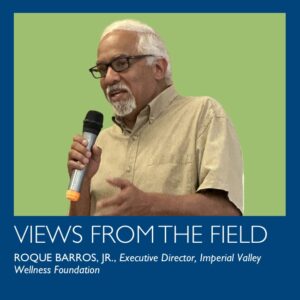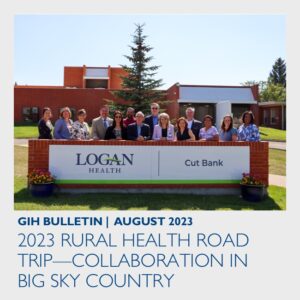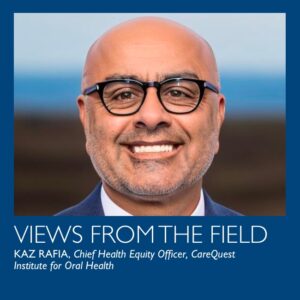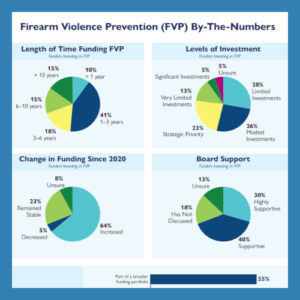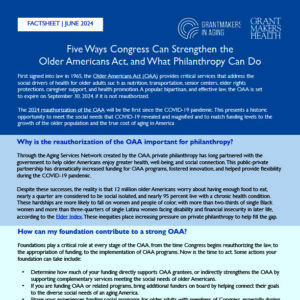Featured Resources
The People Say: A New Older Adult and Caregiver Policy and Research Tool
An online research hub features first-hand insights from older adults and caregivers on the issues most important to them, as well as feedback from experts on policies affecting older adults. The project particularly focuses on the experiences of communities often under-consulted in policymaking, including older adults of color, those who are low income, and/or those who live in rural areas where healthcare isn’t easily accessible.
The Story of Care: A Snapshot of the Care Narrative Change Landscape
At some point, every one of us will need care or need to provide care. The COVID-19 pandemic put a spotlight on the extraordinary contributions of caregivers and exposed the failings caused by our nation’s lack of care policies, especially for communities of color. Deploying narrative-change strategies across care-related issues will help create the conditions for cultural and policy progress. The goal of this report is to share with funders the promising narrative-change strategies and tactics that have been identified, a directory of funders and grantees who are supporting this work, and how philanthropy can best support this effort.
GIH Advocacy for the Reauthorization of the Older Americans Act (OAA)
The OAA provides critical services that address the social drivers of health for older adults. Grantmakers In Health (GIH) and Grantmakers In Aging (GIA) are partnering to engage funders in advancing the reauthorization of this important piece of legislation.
Explore Population Health Topics
Latest Resources
The SCAN Foundation: September 2023
The SCAN Foundation published a report analyzing 2014-2020 Health and Retirement Study (HRS) data. The analysis found racial inequities in telehealth, access to care, and health status during the first year of the pandemic. In 2020, non-Hispanic Black and Hispanic adults over 50 experienced worse self-reported health status, used less telehealth, delayed care more, and were less likely to have their care preferences considered compared to their white counterparts.
CareQuest Institute: August 2023
CareQuest Institute is offering 10 grants of up to $125,000 to fund projects that are working to address systemic barriers to oral health, including access to oral health, for people with disabilities.
Health Philanthropy Impacting the Health and Well-Being of Family Caregivers
More than 53 million Americans—21 percent of the US population—are caregivers for loved ones who are older adults or adults living with chronic, disabling, or serious health conditions. Increasingly, the US health and long-term care systems rely on family caregivers. In 2017, family caregivers in the US provided a staggering 80 percent of long-term care, valued at $470 billion, and in 2021, 38 million family caregivers spent 36 billion hours caring for older adults, amounting to an estimated $600 billion in unpaid caregiving.
Publications and Reports
2024 Survey Summary: Firearm Violence Prevention Strategies
GIH conducted a survey in September 2024 about funder engagement in firearm violence prevention. This fact sheet summarizes the survey results with a total sample of 81 health funders. This public health crisis and social justice issue is preventable, and health funders have an important role to play in advancing firearm violence prevention efforts.
Progress Report: Older Americans Act Reauthorization Campaign
In October 2023, Grantmakers In Aging (GIA) and Grantmakers In Health (GIH) launched an 18-month initiative to engage funders in the reauthorization of the Older Americans Act (OAA). This report highlights key activities and takeaways and previews future programming.
Fact Sheet: Five Ways Congress Can Strengthen the Older Americans Act, and What Philanthropy Can Do
First signed into law in 1965, the Older Americans Act (OAA) provides critical services that address the social drivers of health for older adults such as nutrition, transportation, senior centers, elder rights protections, caregiver support, and health promotion. A popular, bipartisan, and effective law, the OAA is set to expire on September 30, 2024, if it is not reauthorized. Foundations play a critical role at every stage of the OAA, from the time Congress begins reauthorizing the law, to the appropriation of funding, to the implementation of OAA programs. Now is the time to act.
Connect With Funder Peers on Population Health
Interested in exchanging strategies, information, and questions with your funder peers? Sign up for GIH E-Forums.


